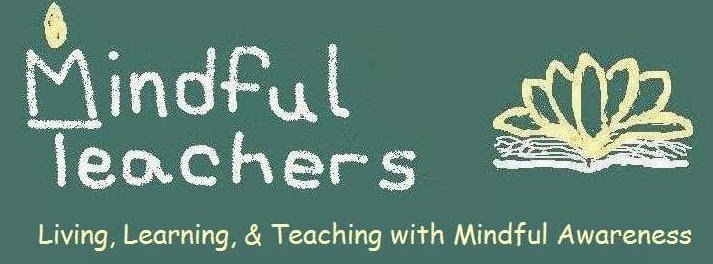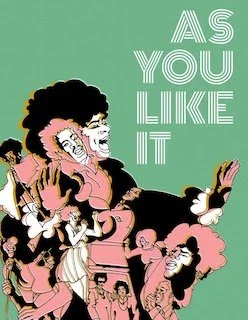Mindfulness in Theater: Q+A with Hannah Todd & Renana Fox
published May 5, 2013
Following up on last week’s discussion with Lean & Hungry Theater’s Artistic Director, Jessica Hansen, this is an e-interview with Hannah Todd and Renana Fox, co-directors of Lean & Hungry’s production of As You Like It, a live radio performance set at the “Arden Music Festival.”
In this Q+A with Catharine Hannay, founder of MindfulTeachers.org, Hannah and Renana discuss a mindful approach to working in the theater.
Catharine: What is it like working with a co-director? What are the advantages and challenges of sharing responsibility for the production?
Hannah: Working with a co-director can certainly be challenging, but working with Renana is a delight. The important thing is making sure you’re on the same page, and both being willing to collaborate. The advantages are myriad – having another mind there to bounce ideas off of, being able to share duties to get things done more efficiently, etc. I always find that the best creativity comes from collaboration, so in that sense, having a co-director is excellent!
Renana: Working with Hannah is really a fantastic experience for me. She has a wonderful grasp of Shakespearean text and we tend to share an overall artistic vision. We can bounce ideas off of each other and offer feedback and solutions. It just makes the whole process a little easier to have someone working with you. Obviously the challenge comes when you have differing opinions, but we’re both pretty good at explaining our ideas and listening to each other. At the end of the day I feel like working together helps me be a stronger director because her questions and differing opinions force me to really explore and question my own ideas.
Catharine: How did you get involved with Lean & Hungry Theater? What kind of theater background did you have?
Hannah: I first worked with L&H when I was asked to assistant direct and dramaturg Romeo and Juliet in winter of 2011. From there I moved on to directing A Midsummer Night’s Dream in summer of 2011, assistant directing Hamlet in fall of 2011, and directing The Tempest in spring of 2012. I’ve been directing since college. I’ve been working around DC since 2008, including starting my own little theater company here called We Happy Few Productions, which does stripped down ensemble Shakespeare. It’s a great town for Shakespeare!
Renana: A friend of mine put me in touch with Jessica Hansen and I met her for coffee to talk about her company. I was really just curious to hear about how the company worked and before the meeting was over she’d already gotten me involved in two or three projects- she’s very persuasive! In college I majored in theater and since graduating I have worked with a number of educational theater companies in a variety of roles. I’ve directed around town on various projects but there’s something very different and exciting about radio broadcast theater that’s incredibly appealing.
Catharine: Why did you decide on setting As You Like It at a music festival? What kind of music will we hear?
Hannah: A music festival like Woodstock seemed a perfect parallel to Shakespeare’s forest – a place where people could explore their identities, fall in love, and get away from the constraints of the “court world.” The music is going to be influenced by the folk and rock music heard at Woodstock.
Renana: What really helps create the world of the music festival is the soundtrack, and of course the vocal choices made by the actors. Additionally the style and tone of the narrator’s text is very much based in the world of our festival concept.
Catharine: Did you have to make a lot of changes to the play to adapt it to the 1960s?
Hannah: As always when transposing Shakespeare to a different time period, it’s remarkably easy. Shakespeare’s timeless stories and characters seem to be at home at any point in human history!
Renana: We really don’t believe in adapting the text itself by changing words. What we do is add in a narrator who is able to explain the bits and pieces that had to be cut from the text to bring the show down to 60 minutes in length.
Catharine: What advice would you give for a young director just starting out? What are the challenges of staging and adapting Shakespeare, compared to contemporary playwrights?
Hannah: My biggest piece of advice when it comes to directing Shakespeare – or acting, or reading, or seeing, or hearing it – is don’t be afraid! We all seem to be instilled with this reverence for Shakespeare which paralyzes us with fear. Yes, Shakespeare is the world’s greatest writer, etc. etc., but when it comes down to it, it’s just amazing stories with amazing characters saying amazing words. It’s fun, not scary – so have fun with it. Don’t put it up on a pedestal. Dig in and get dirty!
Renana: My advice would be to talk to anyone who will take the time to get coffee with you. Making connections and learning from people with experience is invaluable to a young director. And don’t be afraid to create your own opportunities. Be bold and embarrass yourself.
There are a lot of challenges with Shakespeare. The hardest, I think, is to keep his text down to earth. Sometimes it gets a kind of reverence that scares actors and audiences alike. His text is actually quite funny and relatable. Getting everyone to make that leap is always a challenge.
Catharine: What does “mindful teaching” mean to you? Do you have a mindfulness practice, and if so, how does it help you in your work?
Hannah: Mindfulness is key in theater. You have to be mindful of yourself and mindful of those around you in order to create a real, believable connection with the character, with the other actors onstage, and with the audience. As a director, you have to be mindful of it all – attentive, with open eyes, ears and heart. If any part of you is closed off, you will not get to the deepest truth of the story.
Renana: Mindful teaching, to me, implies that you really think about your approach to the material and have an awareness of how it is being absorbed by students. I try to be conscious of the behavior of others in stressful situations and how they react. It forces me to consider my own reactions but it’s also quite helpful when I’m directing and need to help actors rationalize specific choices.
Related Posts
There are many more resources here at MindfulTeachers.org about teaching mindfulness through the arts, including the following posts:


